photo: Baron Wolman
Sorrow is so easy to express and yet so hard to tell
~Joni MitchellYou could write a song about some kind of emotional problem you are having, but it would not be a good song, in my eyes, until it went through a period of sensitivity to a moment of clarity. Without that moment of clarity to contribute to the song, it’s just complaining.
~Joni Mitchell
Big Yellow Taxi – Live 1970:
I wrote ‘Big Yellow Taxi’ on my first trip to Hawaii. I took a taxi to the hotel and when I woke up the next morning, I threw back the curtains and saw these beautiful green mountains in the distance. Then, I looked down and there was a parking lot as far as the eye could see, and it broke my heart… this blight on paradise. That’s when I sat down and wrote the song.
~Joni Mitchell (to Alan McDougall in 1970)
From Wikipedia:
| Birth name | Roberta Joan Anderson |
|---|---|
| Born | November 7, 1943 (age 75) Fort Macleod, Alberta, Canada |
| Genres | Folk-rock, folk-jazz/jazz, pop |
| Occupations | Musician, singer songwriter, painter |
| Instruments | Vocals, guitar, piano, dulcimer, ukulele, auto-harp |
| Labels | Reprise (1968–1972, 1994–2001) Asylum (1972–1981) Geffen (1982–1993) Nonesuch (2002) Hear Music (2007) |
| Associated acts | Buffy Sainte-Marie, Leonard Cohen, Bob Dylan, Joan Baez,Crosby, Stills, Nash and Young,James Taylor, L.A. Express,Jaco Pastorius, Wayne Shorter,Herbie Hancock, Charles Mingus, Larry Klein, Thomas Dolby, David Crosby, Stephen Stills, Graham Nash, Neil Young,Glenn Frey |
| Website | www.jonimitchell.com |
Joni Mitchell, CC (born Roberta Joan Anderson; November 7, 1943) is a Canadian musician, singer songwriter, and painter. Mitchell began singing in small nightclubs in Saskatchewan and Western Canada and then busking in the streets and dives of Toronto. In 1965 she moved to the United States and, touring constantly, began to be recognized when her original songs (“Urge for Going,” “Chelsea Morning,” “Both Sides, Now,” “The Circle Game”) were covered by notable folk singers, allowing her to sign with Reprise Records and record her own debut album in 1968. Settling in Southern California, Mitchell and her popular songs like “Big Yellow Taxi” and “Woodstock” helped define an era and a generation. Her more starkly personal 1971 recording Blue has been called one of the best albums ever made. Musically restless, Mitchell switched labels and began moving toward jazz rhythms by way of lush poptextures on 1974’s Court and Spark, her best-selling LP, featuring her radio hits “Help Me” and “Free Man in Paris.”

Mitchell’s wide-ranging vocals and her distinctive open-tuned guitar and piano compositions grew more harmonically and rhythmically complex as she explored jazz, melding it with her influences in rock n roll, R&B, classical music and non-western beats. Mitchell’s experimental run of jazz-inspired albums, including 1975’s The Hissing of Summer Lawns and 1976’s Hejira, confused many and hurt Mitchell’s sales at the time, but they are acclaimed today. In the late 1970s, she began working closely with noted jazz musicians, among them Jaco Pastorius, Wayne Shorter, Herbie Hancock, Pat Metheny and Charles Mingus, the last of whom asked her to collaborate on his final recordings. In her later work Mitchell turned again toward pop, embraced electronic music, and engaged in political protest. Mitchell was also the sole record producer credited on most of her albums, including all her work in the 1970s. With roots in visual art, she designed her own album artwork throughout her career. A blunt critic of the music industry, Mitchell quit touring and released her 17th, and reportedly last, album of original songs in 2007. Now based in British Columbia, she describes herself as a “painter derailed by circumstance.”
Mitchell has deeply influenced fellow musicians in a diverse range of genres, and her work is highly respected by critics. Allmusic said, “When the dust settles, Joni Mitchell may stand as the most important and influential female recording artist of the late 20th century,” and Rolling Stone called her “one of the greatest songwriters ever.” Mitchell’s lyrics have been noted for their developed poetics, addressing social and environmental ideals alongside individual feelings of romantic longing, confusion, disillusion and joy.
Amelia – Live 1983:
–
- Check out: Joni Mitchell @ Johnny Cash Show (videos)
- Check out this article from slate.com: The Best Joni Mitchell Song Ever
–
Album of the day:
Blue (1971):

From allmusic.com – Jason Ankeny:
Sad, spare, and beautiful, Blue is the quintessential confessional singer/songwriter album. Forthright and poetic, Joni Mitchell’s songs are raw nerves, tales of love and loss (two words with relative meaning here) etched with stunning complexity; even tracks like “All I Want,” “My Old Man,” and “Carey” — the brightest, most hopeful moments on the record — are darkened by bittersweet moments of sorrow and loneliness. At the same time that songs like “Little Green” (about a child given up for adoption) and the title cut (a hymn to salvation supposedly penned for James Taylor) raise the stakes of confessional folk-pop to new levels of honesty and openness, Mitchell’s music moves beyond the constraints of acoustic folk into more intricate and diverse territory, setting the stage for the experimentation of her later work. Unrivaled in its intensity and insight, Blue remains a watershed. ..check out Blue @ allmusic.com
– Egil & Hallgeir

